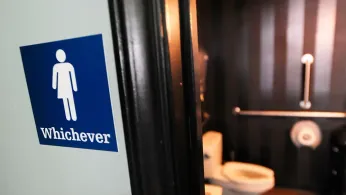
4 hours ago
Texas Senate Advances New Bathroom Bill Targeting Transgender People
READ TIME: 3 MIN.
On August 7, 2025, the Texas Senate State Affairs Committee advanced Senate Bill 7 , a legislative proposal that, if enacted, will require individuals in public schools, universities, and government buildings to use bathrooms and changing facilities that correspond with the sex listed on their original birth certificates. This legislative action marks a return to debates seen in previous years, when Texas and other states considered or enacted so-called "bathroom bills" that have drawn national scrutiny and legal challenges.
SB 7 specifically targets access to multi-occupancy restrooms and changing facilities in state-run buildings and all K-12 public schools. The bill stipulates that these facilities must be designated for use “based on the individual’s biological sex” as indicated on their original birth certificate. Exceptions are limited to single-occupancy restrooms or those provided for family or assisted use. Violations of these rules by public institutions could result in loss of state funding or other penalties.
LGBTQ+ organizations across Texas and the United States have condemned the advancement of SB 7. Leaders from Equality Texas and the ACLU of Texas have reiterated that such legislation disproportionately harms transgender people, particularly transgender youth, by forcing them to use facilities that do not align with their gender identity. This, advocates argue, can increase the risk of harassment, discrimination, and mental health challenges.
Sarah Warbelow, Legal Director for the Human Rights Campaign, stated, “Bills like SB 7 undermine the safety and dignity of transgender youth and adults, sending a harmful message that their identities are not respected or valued by the state.”
Supporters of SB 7, including several Republican lawmakers, argue that the bill is needed to “protect privacy and safety” in shared public spaces. Senator Lois Kolkhorst, who sponsored the bill, asserted during committee hearings that the legislation is about “common sense privacy protections for women and girls.”
However, civil rights organizations and many legal experts contend that there is no credible evidence linking transgender-inclusive restroom policies to increased safety risks. Major medical and psychological associations, including the American Psychological Association, have publicly opposed such restrictions, citing the negative impact on transgender individuals’ well-being.
If enacted, SB 7 would likely face immediate legal challenges. The U.S. Department of Education has previously stated that federal Title IX protections extend to transgender students, and courts have issued mixed rulings on the issue. In June 2024, the Fourth Circuit Court of Appeals ruled in favor of a transgender student seeking access to bathrooms matching his gender identity, a decision that could influence future legal battles in Texas and beyond.
In addition to legal uncertainty, advocacy groups warn that such legislation can lead to increased stigmatization and isolation of transgender people, especially youth, and may contribute to adverse mental health outcomes. According to research published by the Trevor Project, LGBTQ+ youth who experience discrimination or are denied access to appropriate facilities are at significantly higher risk for depression and suicidal ideation.
The advancement of SB 7 in Texas is part of a larger national trend in 2025, where numerous states have introduced or passed similar legislation concerning the rights of transgender people in public spaces, schools, and healthcare. As of August 2025, at least 14 states have considered some form of bathroom restriction bill during the current legislative session.
LGBTQ+ advocates continue to mobilize in response, organizing rallies, letter-writing campaigns, and legal challenges to oppose measures perceived as discriminatory. At the local level, several Texas school districts and city councils have issued statements affirming support for transgender students and staff, vowing to provide safe and inclusive environments regardless of the outcome at the state level.
As SB 7 moves to the full Texas Senate for debate, the outcome remains uncertain. The bill’s progress will be closely monitored by LGBTQ+ organizations, civil rights advocates, educators, and legal experts. Many Texans, including allies, have pledged to continue fighting for the rights and dignity of transgender people, emphasizing the importance of inclusive policies and the ongoing work required to achieve full equality.






